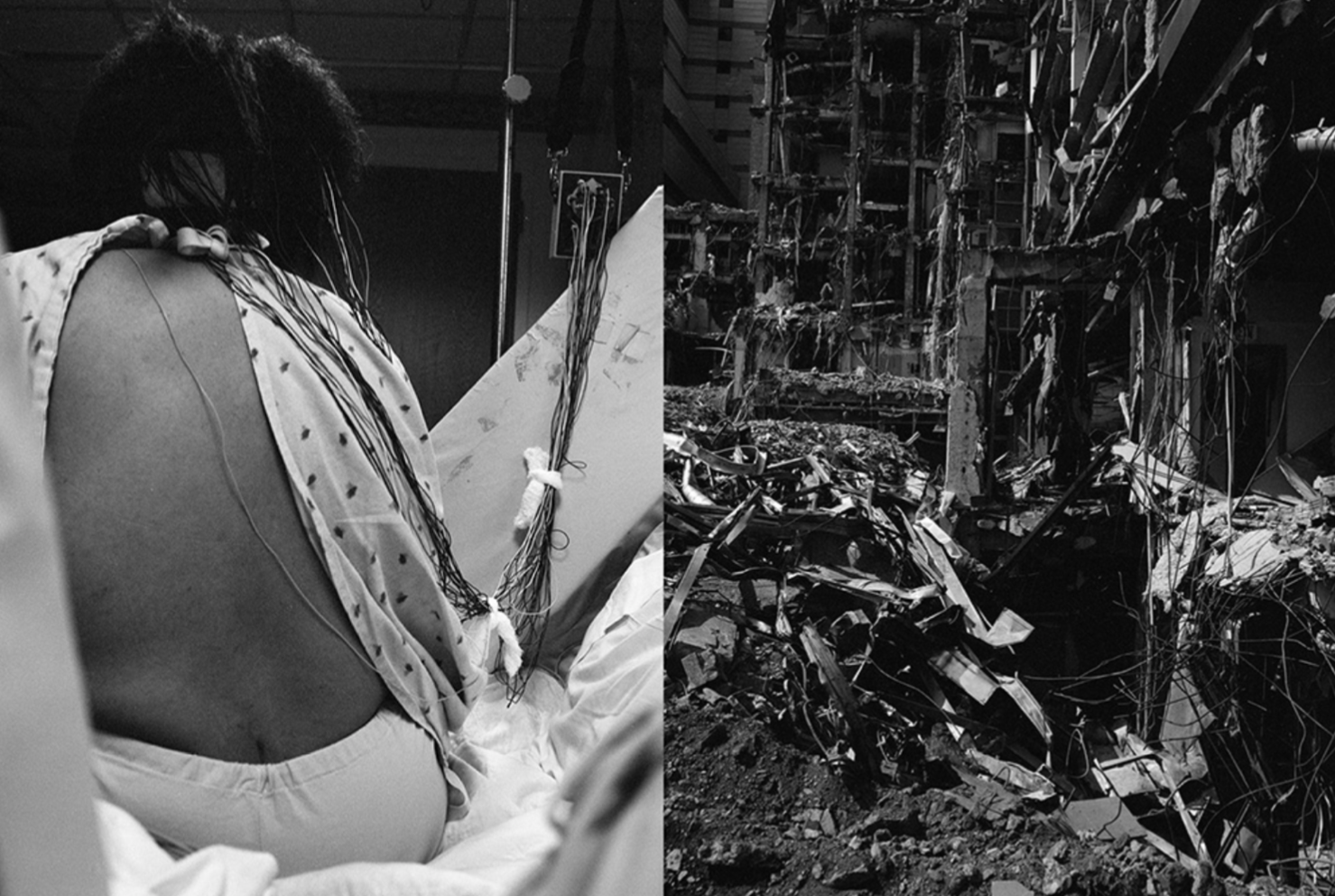by Katie Kirkland
A split frame in black and white juxtaposes two bodies sagging under the weight of their fatigued supports. To the left, the exposed back of a young black woman in an open hospital gown, sitting up in a hospital bed, a tangle of wires snaking down from her hair, along the slight curve of her back and shoulder, to plug into a small black box hanging from the ceiling. To the right, a crumbling building, its internal skeleton laid bare as debris and electrical wire cascade across its decaying frame. A joint portrait of chronic illness and of urban decline, the image succinctly condenses the history of post-industrial slow death in the town where it was taken: Braddock, Pennsylvania, where the once towering steel mills were subsequently replaced by a hospital, frequented by the weary masses living in the wake of economic disinvestment, chemical pollution, white flight and racialized violence.
The young woman in the photograph is the photographer LaToya Ruby Frazier, a native of Braddock, whose series The Notion of Family (2001-2014) maps the intergenerational family history of the Frazier women – LaToya, her mother Cynthia, and her grandmother Ruby– against the broader tapestry of black working class life in Braddock. The photograph threads together the quiet devastation of the sick body and crumbling building with an insistence on arresting a moment in which both, if laboriously, continue to hold themselves upright; this tension condenses the striking power of the series as a whole, which stands not only as an archive of decline, but also one of ongoing survival. “Each time I froze a frame from my reality,” Frazier reflects, “it was one step closer to removing what I can only describe as an intangible slow deterioration of my family.”
The camera’s capacity to act against the intractable march of time, the “slow deterioration” of Frazier’s family and town, is enabled in large part by her method of working, through the years-long, collaborative relationships Frazier establishes with her photographic subjects. In The Notion of Family, Frazier’s central creative collaborator is her mother. Sharing the camera to pose both with and as one another, Frazier and her mother stage photographs that attest to the labors of intimacy, registering both the fragility of their relationship – in tensed postures and distant framings – and the indissolubility of their kinship – in their mirrored gestures and shared ailments, their mutual commitment to framing and viewing one another.


Frazier’s series neither takes intimacy as a given, nor does it mythologize the family as private, feminine refuge from social harms. However, it does insist on the domestic and the intimate as a site of struggle that refracts and amplifies broader histories and political struggles. While it takes up a documentary aesthetic, The Notion of Family refuses the paternalistic gaze and presumption of unmediated access that attends certain traditions of “socially engaged” photography, especially those treating the working poor. Frazier’s subjects are either pictured in gestures of withdrawal – turning away, sinking into a moment of stolen rest, splayed out on a bed or couch or slumped against a wall– or in conscious poses, arranging themselves to meet the camera – leaning on an arm, raising a chin, sloping one’s shoulders, fixing the jaw, staring determinedly at the lens. Her photographs foreground the labor of their own crafting – not only the formal staging and visual framing of the images, but the embodied labor of bringing them into being, of presenting oneself to the lens. The series’ formal emphasis on composure both registers and defies the vulnerabilities of ongoing exposure, pushing against the discomfort of the camera’s intrusion into private life, against the emotional, material, and historical devastation slowly eating away at Braddock. Instead, Frazier lovingly tracks the weary gestures by which her family and her community carry on, whether by picketing day after day outside the hospital that refuses them care (and would eventually shutter its doors), or by simply leaning against one another for support, a place to rest a heavy head. And it is ultimately in attuning itself to the ways that both intimate and social histories are repeatedly rehearsed and sustained that The Notion of Family insists on their capacity to be met, confronted, and changed.




One thought on “LaToya Ruby Frazier’s ‘The Notion of Family’ (2001-2014)”